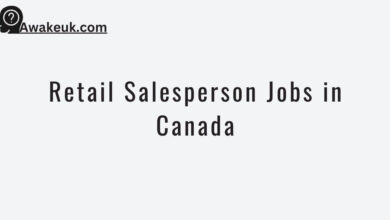Visa Sponsorship Healthcare Jobs in Canada 2024 – Apply Now

Are you interested in working in healthcare and looking for work in Canada? You’ve come to the right site if you’re an international worker looking for healthcare jobs in Canada with visa sponsorship. Canada has a strong healthcare system and a wide range of work prospects in the healthcare area. In this post, we will look at the healthcare employment market in Canada, go over the visa sponsorship procedure, and offer advice on how to get a healthcare job in the country.
Details of Visa Sponsorship Healthcare Jobs in Canada:
- Job Category: Hospital & Health Care
- Job Type: Full-Time
- Job Location: Canada
- Basic Salary: $2500-$3000 Per Month
Overview of Healthcare Jobs in Canada:
Healthcare workers in Canada have numerous job prospects in the healthcare industry. The healthcare sector is broad and always in demand, from doctors and nurses to allied health workers and administrators. Healthcare jobs include positions in hospitals, clinics, long-term care facilities, home healthcare, and research institutes. The commitment of Canada to delivering high-quality healthcare services fosters a favorable environment for healthcare professionals.
Job Roles and Responsibilities:
Depending on their specialty, healthcare professionals in Canada take on a variety of duties and responsibilities. The following are some common employment roles in the healthcare industry:
- Registered Nurse (RN): Direct patient care, medication administration, and treatment plan coordination.
- Physician: Physicians diagnose and treat ailments, execute medical operations, and care for patients.
- Medical Laboratory Technologist: Performs tests on patient samples, analyzes results, and aids in disease diagnosis.
- Physiotherapist: Physiotherapists use manual treatment and exercises to assess and treat patients with physical impairments, injuries, or chronic diseases.
- Medical Administrator: Manages healthcare facilities, oversees administrative activities, and ensures the company runs smoothly.
Benefits of Healthcare Jobs in Canada:
- Consequences for Lives: Healthcare professionals exert a tangible influence on individuals’ lives through the provision of treatment, the prevention of disease, and the promotion of health. A positive impact on the well-being of patients is a frequent source of satisfaction in this line of work.
- Maintaining Job Stability: Consistently high demand for healthcare professionals ensures employment security and a comparatively minimal likelihood of unemployment. Healthcare remains a resilient sector, even in the face of economic downturns.
- Diverse Opportunities for Employment: The healthcare industry provides an extensive array of professional trajectories. By selecting from a variety of specializations, including administration, research, nursing, medicine, allied health, and allied health, professionals gain career advancement and flexibility.
- Continuous Education: Constant progress is being made in the areas of technology, treatments, and medical understanding. Opportunities exist for healthcare professionals to engage in continuous learning, thereby maintaining their current skills and knowledge.
- Comparative Wages: Compensatory salaries are a characteristic of numerous healthcare occupations that are commensurate with the requisite skills, education, and training. Compensation tends to be higher for specialized fields that are in high demand.
- Satisfaction at Work: The ability to assist others and positively influence the lives of patients are factors that contribute to the considerable levels of job satisfaction that are observed in healthcare professions. Motivation is significantly influenced by the sense of fulfillment derived from providing care and support.
- The Potential for Global Opportunities: International employment may present healthcare professionals with the chance to utilize their expertise in serving various populations while acquiring familiarity with distinct healthcare systems and practices.
- Collaboration in Teams: Collaborative efforts with other professionals, including physicians, nurses, therapists, and support personnel, are essential in the healthcare industry. In order to provide comprehensive patient care, collaboration is vital.
- Potential Areas for Specialization: Professionals in the healthcare industry are frequently permitted to specialize in particular fields of interest. Specialization affords opportunities for professional growth, enhanced proficiency, and occasionally increased financial gains.
- Emotional Incentives: Although healthcare professionals encounter various obstacles, they are also granted emotional fulfillment through the observation of favorable patient outcomes, the resolution of medical obstacles, and the establishment of significant relationships with patients and their families.
- Innovation and Technological Advances: The healthcare industry is a leader in technological progress. Experts in the respective domain possess state-of-the-art technologies and instruments that enhance the efficacy of diagnostic procedures and therapeutic interventions.
- The Influence on the Community: Professionals in the healthcare industry contribute to the health and well-being of communities as a whole. They contribute significantly to community outreach, health education, and public health initiatives.
Visa Sponsorship in Canada:
Visa sponsorship is critical for international workers looking for jobs in Canada’s healthcare industry. Visa sponsorship permits foreign workers to work and live legally in the country. It is crucial to remember, however, that visa sponsorship availability varies depending on the exact employment position, employer, and candidate requirements. Employers may sponsor visas for competent healthcare professionals in order to fill skill gaps and meet the Canadian population’s healthcare demands.
How to Find Healthcare Jobs with Visa Sponsorship:
It is critical to use a variety of resources and techniques when looking for healthcare jobs in Canada with visa sponsorship. Online employment sites, healthcare-specific job boards, and professional networking platforms are great places to start. Networking with business leaders, attending industry conferences and events, and interacting with recruitment agencies can all give valuable leads. Consider directly contacting Canadian healthcare companies to inquire about visa sponsorship opportunities.
Steps to Secure a Healthcare Job in Canada:
Follow these measures to improve your chances of landing a healthcare career in Canada:
- Improve your resume: Make your resume stand out by emphasizing relevant skills, certifications, and experiences in the healthcare profession.
- Create an enticing cover letter: Make your cover letter unique by emphasizing your love for healthcare, motivation, and how your abilities match the job criteria.
- Investigate possible employers: Learn about the organization’s beliefs, culture, and specific healthcare requirements so that you may design your application properly.
- Prepare for interviews by doing the following: Familiarize yourself with common healthcare interview questions and be prepared to demonstrate your knowledge, skills, and expertise.
- Obtain the following certifications: Depending on your healthcare profession, obtaining qualifications such as licensure or specialized training can help you find work.
- Take the initiative: After submitting your application, contact potential companies to show your interest and enthusiasm.
Essential Skills for Healthcare Professionals:
To flourish in their positions, healthcare practitioners must possess a set of essential abilities. These are some examples:
- Excellent interpersonal and communication abilities
- Compassion and empathy toward patients
- precision and attention to detail
- Ability to think critically and solve problems
- Ability to collaborate well in a team Adaptability and flexibility
- Healthcare legislation and best practices knowledge
- Knowledge of healthcare technology and electronic medical record (EMR) systems
Training and Certifications:
Investing in training and certifications is critical for healthcare professionals looking to advance their careers. Consider getting certificates like:
- ACLS stands for Advanced Cardiac Life Support.
- PALS stands for Pediatric Advanced Life Support.
- Advanced Practice Registered Nurse (APRN) certification Basic Life Support (BLS) certification Board certification in specialized medical disciplines
These credentials not only reflect your competence but also your dedication to providing high-quality treatment.
Career Growth Opportunities:
The healthcare industry in Canada provides significant prospects for advancement. Healthcare professionals can enhance their careers by specializing, taking on leadership positions, or participating in research and academics. Continuous learning, professional development programs, and attendance at conferences or seminars can all help to improve one’s career chances in the healthcare industry.
Working Conditions and Safety Measures:
Working conditions in the healthcare industry vary according to the job role and work environment. Healthcare practitioners frequently work in fast-paced, dynamic environments, dealing with patients and cooperating with multidisciplinary teams. Employers must provide a safe working environment for their employees, which includes providing appropriate training, personal protective equipment (PPE), and complying with healthcare safety rules.
Cost of Living in Canada:
Before applying for a healthcare career in Canada, consider the cost of living. Canada has a wide range of cities with various living costs. The cost of living in major cities like Toronto, Vancouver, and Montreal is higher than in smaller communities. Housing, transportation, healthcare, and taxes all contribute to the total cost of living. Researching and organizing your budget correctly will help you maintain a comfortable quality of living.
Check Also: Visa Sponsorship Unskilled Jobs in Canada 2024 – Apply Now
Canadian Work Culture:
Understanding the Canadian work culture is essential for a successful job search and integration into the healthcare industry. Professionalism, teamwork, diversity, and patient-centered care are valued in Canadian healthcare institutions. It is highly respected to cultivate good relationships with coworkers and patients through efficient communication and teamwork. To make a good impression and support professional progress, become acquainted with Canadian healthcare norms and etiquette.
Tips for a Successful Job Application:
Consider the following strategies to improve your chances of success in your healthcare job application:
- Make your application materials unique for each job opportunity.
- Emphasize applicable talents, experiences, and accomplishments.
- Display your enthusiasm for healthcare and patient care.
- Please provide references from past employers or coworkers.
- Follow the application submission procedures provided by the employer.
Challenges and How to Overcome Them:
You may face difficulties while looking for healthcare employment in Canada with visa sponsorship. These can include things like competitiveness, adjusting to a new healthcare system, and overcoming language obstacles. To overcome these obstacles:
- Improve your language abilities by taking language classes or using online tools.
- Learn about the Canadian healthcare system and its rules.
- Look for internships or volunteer opportunities to get Canadian healthcare experience.
- Connect with Canadian healthcare professionals to obtain insights and make connections.
Conclusion:
The healthcare industry in Canada provides numerous prospects for healthcare professionals seeking visa sponsorship. Understanding the employment market, obtaining suitable skills and certifications, and employing efficient job search tactics can all help you land a healthcare job in Canada. Visa sponsorship is available for eligible international workers, and with the appropriate approach, you can begin a successful career in Canada’s healthcare profession.
For More Info:
Email Your CV, and We’ll Find the Best Pathway For you: info@awakeuk.com
Frequently Asked Questions:
-
Can I work as a healthcare assistant in Canada?
To register, you must have finished a six- to nine-month Health Care Assistant program offered by BC colleges or show documentation of comparable training and experience. Private healthcare providers may presently hire unregistered healthcare assistants, but this may change at any time.
-
Am I eligible to be sponsored in Canada?
You must be a Canadian legal resident or a Canadian citizen. Not be imprisoned, insolvent, subject to a removal order (if a permanent resident), or accused of a serious offense; and. You must not have been sponsored to come to Canada as your partner during the last five years.
-
How much do healthcare jobs pay in Canada?
The average healthcare salary in Canada is $91,888 per year or $47.12 per hour. Entry-level positions start at $49,686 per year, while most experienced workers make up to $151,462 per year.



